PIGLET: Food and female appetite in fiction
What society's perception of our relationship to food and eating says about us | through the lens of the novel Piglet by Lottie Hazell
I saw Piglet described as the stylish “it book” of the year so many times before reading, but I needed very little convincing to pick this one up. This book checks so many of my “should I read this?” boxes - food in fiction, a woman working in publishing (cookbook publishing in this case), glamorous wedding, rich people wreaking havoc, beautiful cover that I would display in my home. Sign me up.
Piglet is a wild ride of betrayal, decadent food descriptions, class struggle, and domestic dissent that makes you squirm in your seat with discomfort. I was completely engrossed and uncomfortable throughout the whole novel, and after I closed the book I immediately sought out interviews and podcast episodes with the author, Lottie Hazell. Her author blurb caught my eye when I saw she “holds a PhD in Creative Writing from Loughborough University and her research considers food-writing in twenty-first-century fiction”.
I’ll be sharing my (many) personal thoughts and takeaways below, but first a glimpse into Piglet for those of you who haven’t yet read it:
Piglet is our titular character, given the unfortunate nickname as a child. She comes from a working class family and she’s itching to distance herself from her family, to free herself of the inferiority she associates with them. Luckily for her, she’s marrying Kit, a seemingly just fine man who comes from a wealthy background and can provide the upward mobility that Piglet is seeking. They’ve just moved into their first home together and their wedding is a few short weeks away. Piglet seems to have finally made it, her professional and personal life on the right track, when Kit reveals an unnamed but heinous betrayal to her that threatens the precarious picture of perfection she has so carefully crafted. The rest of the novel depicts her devolution, her increasingly voracious appetite, and her internal struggle between choosing herself and choosing the life she always thought she wanted.
In this podcast episode, Hazell describes food as the perfect vehicle to discuss class, socioeconomics, self image, interpersonal relationships - and it really made me think: the type of food we consume is so synonymous with our lifestyle, rigidly dictated by the amount of money we have, the palate we’ve fostered through our lived experiences, the access and privilege we’ve been afforded. It’s something treated as either a luxury to indulge in, or an unavoidable necessity that puts a strain on an already tight budget. When asked about the ways that food is central to the novel, Hazell responds “Yeah, I find that very hard to answer because I feel it is the book itself. I feel like there's not an element that it hasn't touched”.
As Piglet moves towards her wedding, we can see how the food she chooses to serve at her wedding is really indicative of the distance she’s attempting to put between herself and her upbringing. Flown-in foie gras, classic French cuisine - it’s a long way from the modest background she comes from. There are two rather antithetical scenes, one where Piglet’s family comes to her new home with Kit and one where she and Kit conversely visit her childhood home, and we see the stark differences in the meals that are prepared and what they say about these different phases of her life. (I have been thinking about the Mediterranean spread she creates for her family since I read this - the way Hazell describes food is so visceral and craving inducing). While her mother shows no less care in the preparation of the dinner, no less love imbued in the meal, it’s clear that this is not what is important to Piglet. It’s the refinement, the status signaling, the showiness that she craves.
In a way, I can relate to this part of her (hopefully with a kinder approach). I come from a less than glamorous upbringing myself, and you could say I’ve had a somewhat singular, ego-feeding focus on figuring out how to improve my own station in life. I recently celebrated a birthday, and the ability to comfortably take myself and my partner out to an Instagrammably beautiful, definitely overpriced cocktail bar and subsequent dinner did in fact internally signal some sort of success to me - look at what I have, what I can pay for, what I can eat, how refined my taste is. In reality, a lot of it actually didn’t taste that good, but you can bet I still slapped up the photos on my social pages (and I think Piglet would absolutely have done the same). There’s certainly a misplaced priority or two here, but I digress.
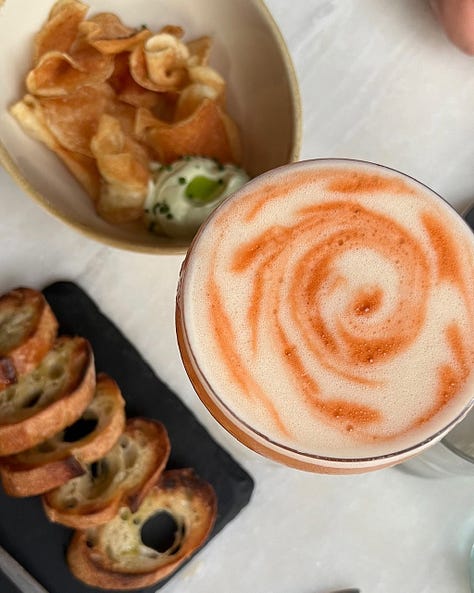
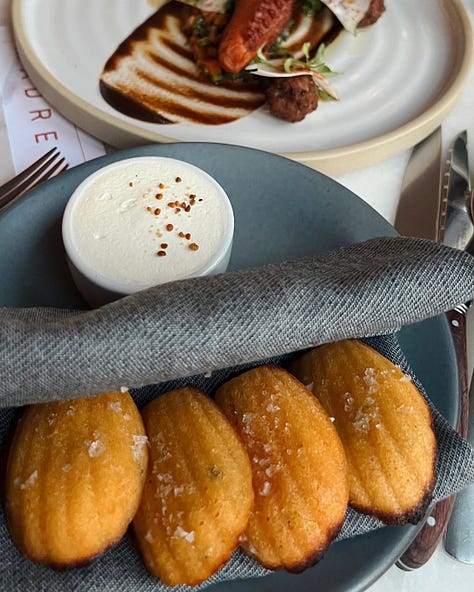

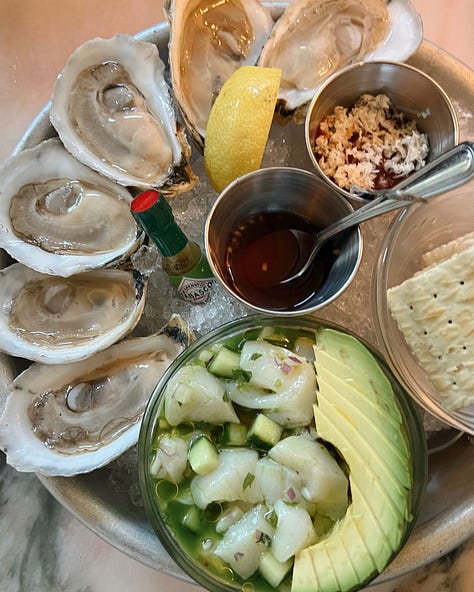


Another use of food in the novel that really resonated with me was the way that Hazell used appetite to explore how we perceive the relationship between women and food, women and eating. Putting aside the insidiousness of wedding diet culture and gender roles within cooking and eating (Piglet decides to make her own wedding Croquembouche as some sort of badge of honor and womanly duty), I’m more interested in the aspect that speaks to how we judge women by the amount they consume. Growing up in the thin-obsessed early 2000s as an overweight child (and still living as a fat woman in 2024, year of our Lord Ozempic), endless amounts of my brain power has been uselessly devoted to how the world perceives me and my eating habits, knowing that society at large will determine my worth and character by how much I can resist the literal life sustaining necessity that is food. No matter how healthily I eat compared to my thin friends, no matter how many salads or green juices I consume, I still glance around to see who may be watching when I eat a cheeseburger or go outside to grab my DoorDashed fast food, knowing it will always be perceived as laziness, gluttony, self destruction. So yes, food signals many true, indisputable things about our lives and selves, but there are also misperceptions of appetite (particularly for women) that we can’t escape.
You only have to read the cringiest parts of this book and experience the secondhand embarrassment to know this is true - the scene where Piglet goes to the burger joint and orders something like 8 burgers knowing she can’t possibly eat them all, only to be discovered by her coworkers, sitting alone surrounded by beef in the restaurant. Or, most uncomfortably, the scene where her wedding dress simply doesn’t fit - one of the more painful scenes I’ve encountered in a book - where Piglet’s father is shaming her for her inability to just put the fork down, her mother is trying to calm down her father, her father, mother, and sister are all working to stuff Piglet into the dress and fasten the tiny, impossible buttons - all the while made more unbearable by the fact that her parents spent more money than they could afford on the dress, desperate to contribute to the big day in some tangible way.
I think I could write a thesis on this book, but I’ll leave it here for now. Clearly this one made an impact on me, and it only felt right that a stylish novel about food be the first one I wrote about here on A Palate for Pages. If you’ve read it, please share your thoughts in the comments - talking about books with other book people is all I ever really want on the internet. I hope you’ll stick around for more thoughts on society, both fictional and real, and my musings on how what I’ve read impacts the way I see myself and the world around me.
Spending long afternoons in a coffee shop is one of my greatest joys in life, and I am so lucky to have so many amazing spots at my fingertips in Brooklyn. I like to curate an atmosphere and special experience when I read a book, especially one I know I’ll love reading - and now I can translate that practice to my Substack writing experience. This post was written in Early Yves coffeeshop in BedStuy Brooklyn, which happens to be where I started the novel as well, over the course of two iced lavender matcha lattes + a lox toast. If you’re local to the area, I highly recommend this neighborhood gem.

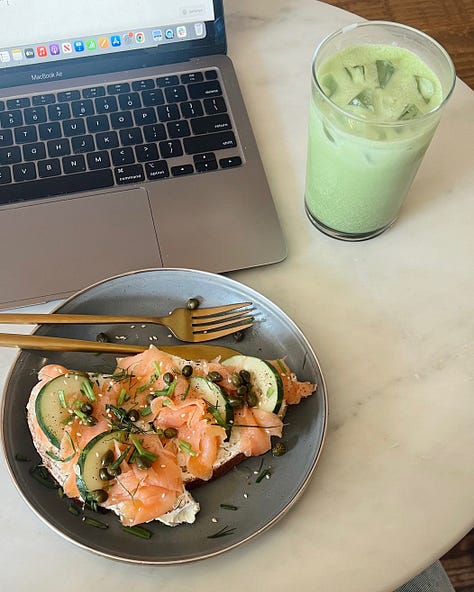
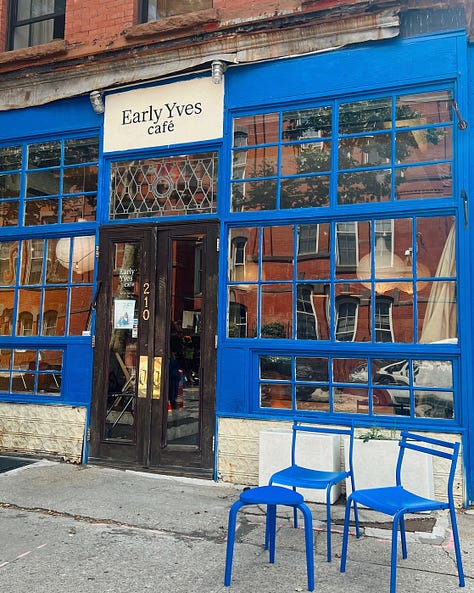


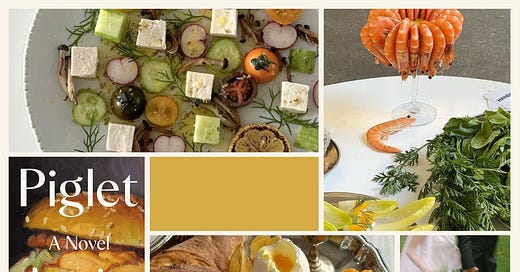



Loved this, you really nailed the salient points, especially about the status signalling - that's so true! I listened to the audiobook earlier this year and I loved the food descriptions, but it was also SO uncomfortable, which I think is the point.
Yay, Jordan, welcome! I loved reading your thoughts on Piglet.